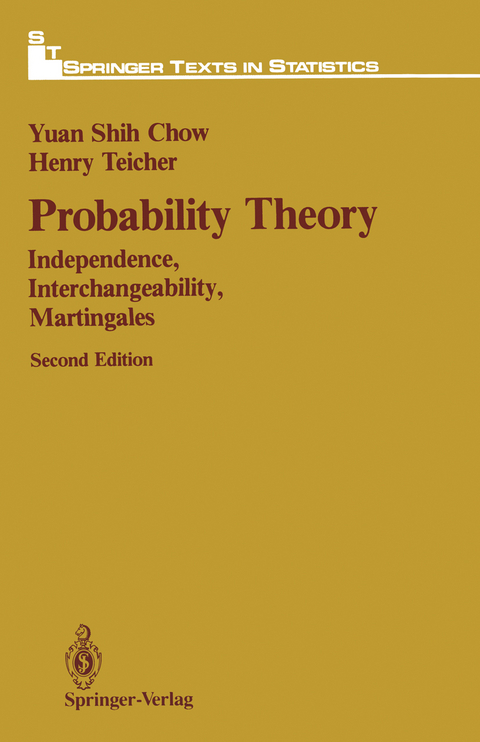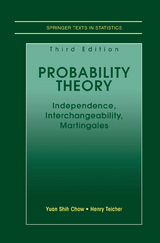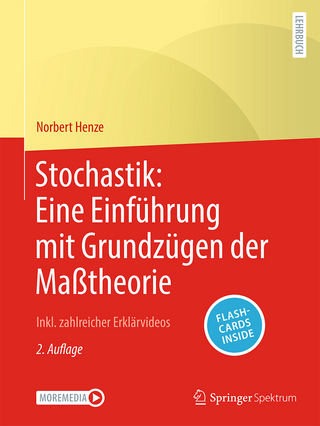
Probability Theory
Springer-Verlag New York Inc.
978-1-4684-0506-4 (ISBN)
- Lieferbar
- Versandkostenfrei
- Auch auf Rechnung
- Artikel merken
1 Classes of Sets, Measures, and Probability Spaces.- 1.1 Sets and set operations.- 1.2 Spaces and indicators.- 1.3 Sigma-algebras, measurable spaces, and product spaces.- 1.4 Measurable transformations.- 1.5 Additive set functions, measures, and probability spaces.- 1.6 Induced measures and distribution functions.- 2 Binomial Random Variables.- 2.1 Poisson theorem, interchangeable events, and their limiting probabilities.- 2.2 Bernoulli, Borel theorems.- 2.3 Central limit theorem for binomial random variables, large deviations.- 3 Independence.- 3.1 Independence, random allocation of balls into cells.- 3.2 Borel-Cantelli theorem, characterization of independence, Kolmogorov zero-one law.- 3.3 Convergence in probability, almost certain convergence, and their equivalence for sums of independent random variables.- 3.4 Bernoulli trials.- 4 Integration in a Probability Space.- 4.1 Definition, properties of the integral, monotone convergence theorem.- 4.2 Indefinite integrals, uniform integrability, mean convergence.- 4.3 Jensen, Hölder, Schwarz inequalities.- 5 Sums of Independent Random Variables.- 5.1 Three series theorem.- 5.2 Laws of large numbers.- 5.3 Stopping times, copies of stopping times, Wald’s equation.- 5.4 Chung-Fuchs theorem, elementary renewal theorem, optimal stopping.- 6 Measure Extensions, Lebesgue-Stieltjes Measure, Kolmogorov Consistency Theorem.- 6.1 Measure extensions, Lebesgue-Stieltjes measure.- 6.2 Integration in a measure space.- 6.3 Product measure, Fubini’s theorem, n-dimensional Lebesgue-Stieltjes measure.- 6.4 Infinite-dimensional product measure space, Kolmogorov consistency theorem.- 6.5 Absolute continuity of measures, distribution functions; Radon-Nikodym theorem.- 7 Conditional Expectation, Conditional Independence, Introduction toMartingales.- 7.1 Conditional expectations.- 7.2 Conditional probabilities, conditional probability measures.- 7.3 Conditional independence, interchangeable random variables.- 7.4 Introduction to martingales.- 8 Distribution Functions and Characteristic Functions.- 8.1 Convergence of distribution functions, uniform integrability, Helly—Bray theorem.- 8.2 Weak compactness, Fréchet-Shohat, Glivenko- Cantelli theorems.- 8.3 Characteristic functions, inversion formula, Lévy continuity theorem.- 8.4 The nature of characteristic functions, analytic characteristic functions, Cramér-Lévy theorem.- 8.5 Remarks on k-dimensional distribution functions and characteristic functions.- 9 Central Limit Theorems.- 9.1 Independent components.- 9.2 Interchangeable components.- 9.3 The martingale case.- 9.4 Miscellaneous central limit theorems.- 9.5 Central limit theorems for double arrays.- 10 Limit Theorems for Independent Random Variables.- 10.1 Laws of large numbers.- 10.2 Law of the iterated logarithm.- 10.3 Marcinkiewicz-Zygmund inequality, dominated ergodic theorems.- 10.4 Maxima of random walks.- 11 Martingales.- 11.1 Upcrossing inequality and convergence.- 11.2 Martingale extension of Marcinkiewicz-Zygmund inequalities.- 11.3 Convex function inequalities for martingales.- 11.4 Stochastic inequalities.- 12 Infinitely Divisible Laws.- 12.1 Infinitely divisible characteristic functions.- 12.2 Infinitely divisible laws as limits.- 12.3 Stable laws.
| Reihe/Serie | Springer Texts in Statistics |
|---|---|
| Zusatzinfo | XVIII, 467 p. |
| Verlagsort | New York, NY |
| Sprache | englisch |
| Maße | 155 x 235 mm |
| Themenwelt | Mathematik / Informatik ► Mathematik ► Wahrscheinlichkeit / Kombinatorik |
| ISBN-10 | 1-4684-0506-3 / 1468405063 |
| ISBN-13 | 978-1-4684-0506-4 / 9781468405064 |
| Zustand | Neuware |
| Haben Sie eine Frage zum Produkt? |
aus dem Bereich



